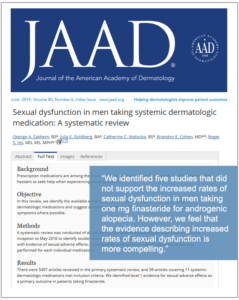Dear Friends:
PFS naysayers’ days may be numbered.
According to new research in the world’s most influential dermatology journal, medical science is leaning further toward the conclusion that finasteride can cause sexual dysfunction in men taking a 1-mg dose for hair loss.
 The paper, titled Sexual dysfunction in men taking systemic dermatologic medication: A systematic review, was published online March 21 in the Journal of the American Academy of Dermatology (JAAD).
The paper, titled Sexual dysfunction in men taking systemic dermatologic medication: A systematic review, was published online March 21 in the Journal of the American Academy of Dermatology (JAAD).
Authors George A. Zakhem and Julia E. Goldberg of the Ronald O. Perelman Department of Dermatology at New York University School of Medicine reviewed all articles in the PubMed database published from its inception through May 2018. The team aimed “to identify studies evaluating the use of systemic dermatologic medications in men with evidence of sexual adverse effects.”
“There were 5,497 articles reviewed in the primary systematic review, and 59 articles covering 11 systemic dermatologic medications met inclusion criteria,” the authors say. “We identified level 1 evidence for sexual adverse effects as a primary outcome in patients taking finasteride.”
(To evaluate epidemiologic evidence supporting causal relationships, the World Cancer Research Fund has defined the four levels of evidence in scientific research as, level 1: convincing, level 2: probable, level 3: possible and level 4: insufficient evidence.)
“[I]n patients taking 5 mg and 10 mg of finasteride, most studies describe relatively common adverse effects of decreased libido, impotence, and ejaculation disorders,” the authors continue.
“We identified 5 studies that did not support the increased rates of sexual dysfunction in men taking 1 mg finasteride for androgenic alopecia. However, we feel that the evidence describing increased rates of sexual dysfunction is more compelling. We identified 10 studies demonstrating sexual adverse effects, including ED and decreased libido.
“Three studies identified in this review describe complete reversibility of sexual dysfunction in all patients, but 11 studies describe patients experiencing irreversible adverse effects. These findings were most convincing in a retrospective review of 11,909 patients that identified 167 with persistent ED.”
The full JAAD paper is currently available only via subscription, on JAAD.org. If you or a loved one have encountered any doctor who dismisses PFS as imaginary, don’t be shy about sharing this, or any of the research housed on our Medical Literature page, with him or her.
Anyone living in the US who suffers from PFS should report his symptoms to the US Food and Drug Administration. Anyone living outside the US who suffers from PFS should report his symptoms to the US Food and Drug Administration as well as to his national drug-regulatory agency, as directed on our Report Your Side Effects page.
Finally, if you or a loved one are suffering from PFS, and feeling depressed or unstable, please don’t hesitate to contact the PFS Foundation as soon as possible via our Patient Support hotline: social@pfsfoundation.org
Thank you.
Related News
